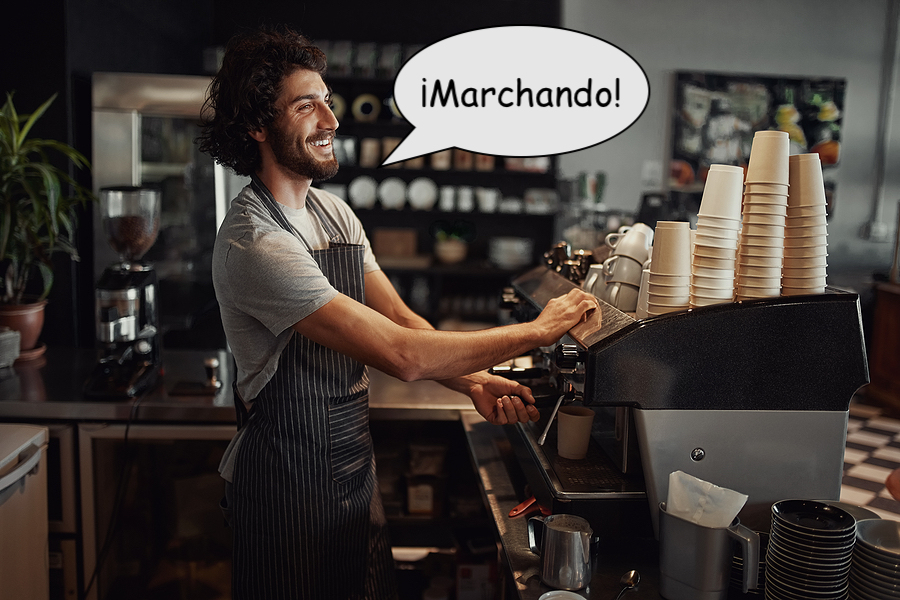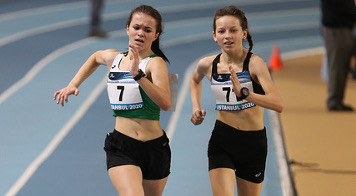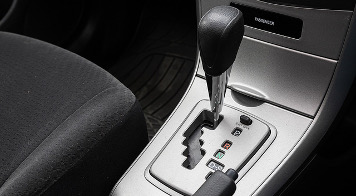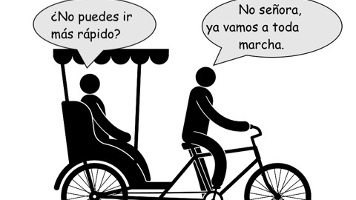
| This is the English transcription of the video above. José explains some expressions with «marcha» or «marchar». In the blog entry below we explain many more. You can also get a mini-lesson that deals with the same topic. Click below to learn more about all our minis. Remember you can get 5 mini-lessons for the price of four: ¡Qué ganga! If you just want to listen to the audio (for example, while driving, cooking, doing the laundry…), you can listen on Soundcloud. Transcription: Hello, I’m José from Real Spanish! Spaniards really like to «salir » (or «ir») de marcha». What does this mean? Well, partying, spending the whole night out in bars or clubs. We also say «salir de juerga» or «salir de parranda». If someone really likes to party, we can say «tiene mucha marcha» or «es muy marchosa». There is also the adjective «juerguista» but with a slightly stronger sense. «La marcha» is also used to talk about the gears of a car engine: to engage first gear, second gear, etc. The expression «marchar como la seda» means that something is going very well, without difficulties. Silk is a very soft fabric, and you can pass your hand over it very smoothly, hence the expression. Another expression that we use a lot is to do something «sobre la marcha», which means to improvise, to do something “on the go”, without a plan, without preparation. There are many more expressions with «marcha», «marchar», or «marcharse», and we explain some in the mini-lesson «Marchando». You ought to add them to your repertoire, because they are used a lot in everyday speech. To encourage you, we have a special offer: if you buy four mini-lessons, we’ll give you another one free… so you can save 20%. Click below to see more information. See you soon! |
The blog entry below deals with this topic in more depth. To view the transcription or the blog entry in Spanish, click on «español» in the main menu above.
Click below for more information on the related mini-lesson, «¡Marchando!».
If you live in Spain, or often visit the country, you must have heard a waiter say this in a bar: «¡Marchando!». It means the waiter is going to bring your order right away, or is going to get to work right away, like switching on a machine.

But the verb «marchar» and the noun «la marcha» have many different uses.
The verb «marchar» has two principal meanings:
In the armed forces «marchar» means «to march». For example:

Los soldados marchan en fila durante el desfile militar.
Referring to a machine, a business, a relationship, «marchar» means “to work”, in the sense of function well. For example:

Esta lavadora no marcha bien, necesitas llamar al mecánico.
Este restaurante no marcha bien desde que cambiaron al cocinero.
Su relación con su novia no marcha bien.
The pronominal verb «marcharse» means “to leave a place”. For example:
Me marcho de casa de mis padres porque quiero vivir sola y ser independiente.

The noun «la marcha» has several meanings:

The functioning of a machine or a business. For example:
Los inversores tienen dudas sobre la marcha del negocio.

La marcha also means the way someone walks. In athletics «la marcha» is “racewalking”. For example:
Laura ha ganado la competición de 10 kilómetros marcha.

«La marcha» is the gear or gearshift of a car engine: For example:
Para cambiar las marchas del coche tienes que pisar el embrague (the clutch).
Expressions with «marcha»:
«Ir o salir de marcha» means to go out partying or to go out to bars or discothèques until late at night. For example:

El sábado voy a salir de marcha con mis amigas, vamos a ir a bailar a una discoteca nueva donde ponen una música muy buena.
«Tener marcha» describes someone who loves partying. For example:

María tiene mucha marcha, siempre sale los fines de semana y se acuesta a las 6 de la mañana, le encanta bailar.
«Sobre la marcha» means “as I/you/we, etc. go”. For example

Estamos aprendiendo a usar este programa nuevo sobre la marcha, mientras trabajamos con él.
«En marcha» means “in progress” For example:

El programa de investigación está en marcha, ya ha empezado.
«Dar marcha atrás» literally means “to reverse” or “move backwards”. Figuratively, it means “to back out”. For example:

Si no estás convencida con la compra de la casa, tienes que dar marcha atrás.
A toda marcha means “at top speed”. For example:

- ¿No puedes ir más rápido?
- No señora, ya vamos a toda marcha.
By the way, we explain this and several other expressions to do with speed in the mini-lesson «¡A toda caña!», and in the blogpost «¡A toda velocidad!» .
Get the mini-lesson «¡Marchando!». It consists of a video, an annotated transcription, a set of grammar notes, and some interactive exercises.
Cllick here to learn more about all our mini-lessons and try a free sample lesson
Leave us a comment, a question or a suggestion. We’d love to hear from you.
Improve your Spanish with us! Click below to find out more about our materials and to try some free sample lessons.
Real Spanish: online Spanish courses and mini-lessons for people who are serious about improving their Spanish.

